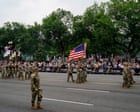In one version of the story, you can blame the French. Evidently it was in France, watching the 2017 Bastille Day military parade alongside Emmanuel Macron at the outset of his first term, that Trump initially got the idea to stage an armed spectacle in Washington DC in honor of himself. Back then, the military said no. In a now-famous anecdote, Gen Paul Selva, who grew up in Portugal under its integralist regime, told Trump that such parades are “what dictators do”. James Mattis, his then-secretary of defense, reportedly revolted against the idea, saying he would “rather swallow acid”. Trump never got his parade.
Until now. Restored to power after an interregnum in which all American institutions failed to hold him accountable for his crimes and abuses, Trump has now set about a second term in which he is pursuing vengeance against his perceived enemies, using his office to enrich himself, and indulging all the impulses that were checked by his staffers and advisers back when anyone serious still worked for him.
Having stuffed the military and defense department leadership exclusively with sycophants and incompetents, Trump is now surrounded exclusively by the kind of people he likes best: people who can’t see any reason not to give him whatever he wants. On Saturday, they gave him a military parade for his birthday, complete with tanks, missiles, airplanes overhead and parachutists. A band sang Happy Birthday. The spectacle was mostly paid for by taxpayers, but there were corporate sponsorships, too – among them the Thiel-backed venture Palantir, and the crypto exchange Coinbase.
If Trump was expecting a display of pomp and pride that rivaled his own egotism, he may have been disappointed. The parade, as it turned out, was something of a disappointing affair. The uniformed soldiers marched irregularly, slightly off beat; the turnout was small and the crowd seemed defeated, low-energy, a bit wilted and unenthused after spending hours in DC’s brutal summer humidity. It rained. It was all a great contrast to the large-scale protests that had exploded across the country earlier that day, with millions taking to the streets in jubilant displays under the banner “No Kings”.
In one, big crowds expressed opposition to Trump’s vision of America, and offered instead a colorful hope for equality and the dignity of self-government. In the other, a desultory group of soldiers trooped through what looked like a mostly empty city – DC had been largely blocked off, in no small part to prevent the protesters from clashing with the military parade and possibly creating a Tiananmen Square-style visual. The soldiers popped up from their tanks and waved wearily to a smattering of onlookers. Once in a while, the bored-looking president roused himself to his feet and delivered a flaccid salute.
This wasn’t what Trump was hoping for. Nominally, the event was meant to mark the US army’s 250th anniversary. But no one really believes that that was the reason for the parade. Instead, the event marked Trump’s 79th birthday, and was meant both to celebrate his seizure of power and underscore his determination to quash dissent. The armed forces were used as an ornament to his ego and a threat to his enemies.
As Trump has illegally seized control of the California national guard, deployed the marines to Los Angeles, disappeared dissidents, crammed migrants into internment camps with atrocious conditions, and had his underlings rough up opposition leaders, the military parade was meant to celebrate his successful pursuit of his dictatorial ambitions, to emphasize the solidity and fearsomeness of his rule, and to remind onlookers that those who oppose him can be met with violence.
All of Trump’s fearsome power and ambition, however, was complicated, in the scenes from the parade, by how obscenely on the nose it all was. Trump clearly wants to be a dictator, and major forces in American politics are helping him become one. But more than wanting to simply be a dictator, Trump also wants to play a dictator on TV.
Trump has always reinforced his politics with an aesthetics: his gilded Trump Tower apartment signifying his wealth, his bouffantish combover and long red ties signifying his winking vulgarity, his love of fast food signifying a declasse self-indulgence.
He is playing to type now, with his military parade, and the type is authoritarian. With his display of power and authority – with the military used as a prop to demonstrate his love of violence and indifference to the constitution – Trump is imitating himself, seeming to cast one eye to the viewer for their reaction. He seems to imagine, always, what his next line would be in the sitcom – a bit like the mobsters on The Sopranos, who modeled themselves self-consciously off of characters in The Godfather and Goodfellas. He’s thinking less of what he wants to do, less of what his true interests or impulses are, and more of what someone like him, a dictator, should be doing.
In this way, though it has become easy to fear and hate Trump, it has always remained a bit hard to take him seriously: he is a simulacrum of a strongman dictator, doing the things he has seen strongmen dictators do on TV. It can feel buffoonish, this self-referentiality; it implies a lack of spontaneity, a sense that perhaps, if he needs to prove his own power so badly, Trump might not actually believe in it. But perhaps this is another lesson of our age, the one in which irony and sincerity have collapsed, and in which the dictator tries, with evident effort, to hit his marks on the screen: just because he’s faking it, doesn’t mean it’s not the real thing.
Moira Donegan is a Guardian US columnist
